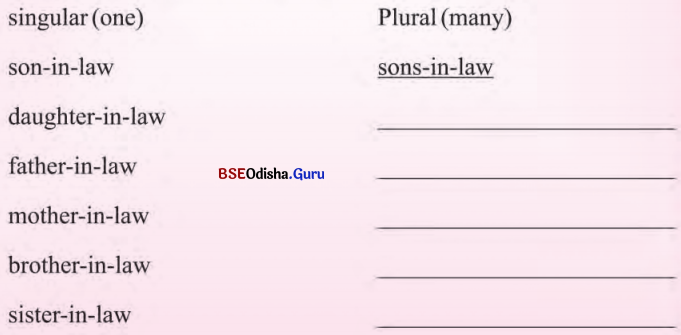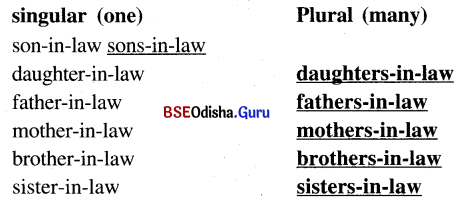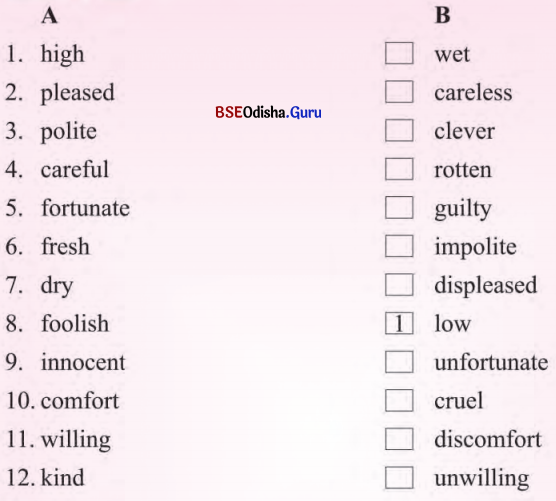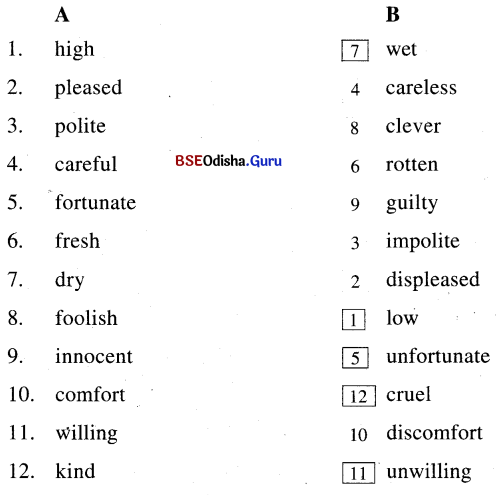Odisha State Board BSE Odisha 6th Class English Solutions Lesson 2 The Foolish Son in Law Textbook Exercise Questions and Answers.
Class 6th English Chapter 2 The Foolish Son in Law Question Answers BSE Odisha
The Foolish Son in Law Class 6 Questions and Answers
Session – 1 (ସୋପାନ – ୧):
I. Pre-Reading (ପଢ଼ିବା ପୂର୍ବରୁ):
→ Socialisation (ସାମାଜିକୀକରଣ) :
→ Students, do you know there are many stories about foolish sons-in-law?
→ These stories are there in every language. Can anyone of you tell us such a story?
→ Do you want to listen to such a story ? (Teacher tells the following story.) ଶିକ୍ଷାର୍ଥୀଗଣ, ନିର୍ବୋଧ ଜ୍ଵାଇଁମାନଙ୍କ ବିଷୟରେ ଅନେକ ଗପ ଅଛି ବୋଲି ତୁମେ ଜାଣିଛ କି ? ପ୍ରତ୍ୟେକ ଭାଷାରେ ଏପରି ଗପସବୁ ଅଛି । ତୁମମାନଙ୍କ ମଧ୍ୟରୁ କେହି ଜଣେ ଆମକୁ ଏପରି ଗୋଟିଏ ଗପ କହିପାରିବ କି ? ତୁମେ ଏପରି ଗୋଟିଏ ଗପ ଶୁଣିବାକୁ ଚାହିଁ କି ? (ଶିକ୍ଷକ ନିମ୍ନଲିଖୁତ ଗପଟି କହିବେ ।)

There was a village quack (a fake or false practitioner). He also trained his son to be a quack. One day the father-in-law of his son had a fever. He, therefore, sent his son to treat his father-in-law. When his son was about to leave, he gave him some advice. “Listen, son. Common sense will make you a great doctor. Simple common sense. Then he gave him an example from his experience. “Once I went to treat a patient.
I saw banana peels (banana skin) under his cot. Then testing his pulse (feeling) I said,” “You must have taken a banana. That is why you have a bad cold. The patient and his father were surprised. How could I tell from his
 pulse that he had eaten a banana? In this way using my common sense, I became a very famous doctor. Therefore, son, use your common sense.”
pulse that he had eaten a banana? In this way using my common sense, I became a very famous doctor. Therefore, son, use your common sense.”
The son went to his father-in-law. He saw him lying on a cot. Under the cot, a cat was sleeping. Now he wanted to use his common sense like his father to become famous. He took the pulse of his father-in-law for some time and pretended to think. Then he said “Father-in-law, you must have eaten a cat, which is why you are running a high temperature. Do you want to read a similar story? Here is one for you.
ଜଣେ ଗାଉଁଲି ଅସାଧୁ । ଠକ ବୈଦ୍ୟ ଥିଲେ । ସେ ମଧ୍ୟ ତାଙ୍କ ପୁଅକୁ ଜଣେ ଅସାଧୁ । ଠକ ବୈଦ୍ୟ ହେବାକୁ ତାଲିମ ଦେଲେ । ଦିନେ ତାଙ୍କ ପୁଅର ଶ୍ଵଶୁରଙ୍କୁ ଜ୍ଵର ହେଲା । ତେଣୁ ସେ ତାଙ୍କ ପୁଅକୁ ଶ୍ଵଶୁରଙ୍କ ଚିକିତ୍ସା କରିବାକୁ ପଠାଇଲେ । ଯେତେବେଳେ ତାଙ୍କ ପୁଅ ଯିବାକୁ ବାହାରୁଥିଲେ, ସେ ତାଙ୍କୁ କେତେକ ଉପଦେଶ ଦେଲେ । ‘‘ମନଦେଇ ଶୁଣ, ପୁଅ । ସାଧାରଣ ଜ୍ଞାନ ତୁମକୁ ଜଣେ ବିଶିଷ୍ଟ ଚିକିତ୍ସକ କରିଦେବ । ସରଳ ସାଧାରଣ ଜ୍ଞାନ ମାତ୍ର ।’’ ତା’ପରେ ସେ ତାଙ୍କ ଅନୁଭୂତିରୁ ଏକ ଉଦାହରଣ ଦେଲେ । ‘‘ଥରେ ମୁଁ ଜଣେ ରୋଗୀକୁ ଚିକିତ୍ସା କରିବାକୁ ଗଲି । ମୁଁ ତାଙ୍କ ଖଟତଳେ କଦଳୀ ଚୋପା ଦେଖିଲି । ତା’ପରେ ତାଙ୍କର ନାଡ଼ୀର ଗତିକୁ ପରୀକ୍ଷା କରି ମୁଁ କହିଲି, ‘ତୁମେ ନିଶ୍ଚୟ କଦଳୀ ଖାଇଛ । ସେଇଥ୍ପାଇଁ ତୁମକୁ ଭୀଷଣ ଥଣ୍ଡା ହୋଇଛି ।’’ ରୋଗୀ ଏବଂ ତାଙ୍କ ବାପା ଆଶ୍ଚର୍ଯ୍ୟ ହୋଇଗଲେ ।

ମୁଁ କେମିତି ତାଙ୍କର ନାଡ଼ୀ ଦେଖୁ ସେ କଦଳୀ ଖାଇଥିଲେ ବୋଲି କହିପାରିଲି । ଏହିପରି ଭାବରେ ମୋ’ର ସାଧାରଣ ଜ୍ଞାନ ବ୍ୟବହାର କରି, ମୁଁ ଜଣେ ବହୁତ ବଡ଼ ପ୍ରସିଦ୍ଧ ଚିକିତ୍ସକ (ଡାକ୍ତର) ହୋଇଗଲି । ଏଣୁ, ପୁଅ, ତୋ’ର ସାଧାରଣ ଜ୍ଞାନ ବ୍ୟବହାର କର ।’’ ଜ୍ଞାନକୁ ବ୍ୟବହାର କରି ପ୍ରସିଦ୍ଧ ହେବାକୁ ଚାହିଁଲା । କିଛି ସମୟ ପାଇଁ ସେ ତା’ର ଶ୍ଵଶୁରଙ୍କର ନାଡ଼ୀକୁ ପରୀକ୍ଷା କଲା ଏବଂ ଚିନ୍ତା କଲାଭଳି ଛଳନା କଲା । ତା’ପରେ ସେ କହିଲା, ‘ଶ୍ଵଶୁର ମହାଶୟ, ଆପଣ ନିଶ୍ଚୟ ଗୋଟିଏ ବିରାଡ଼ିକୁ ଖାଇଛନ୍ତି, ଯେଉଁଥିପାଇଁ ଆପଣଙ୍କୁ ଭୀଷଣ ଜ୍ଵର ହୋଇଛି ।’’
(ତୁମେ ସେହିଭଳି ଆଉ ଗୋଟିଏ ଗପ ପଢ଼ିବାକୁ ଚାହୁଁଛ କି ? ଏଠାରେ ତୁମ ପାଇଁ ଗୋଟିଏ ଅଛି ।)
![]()
II. While-Reading (ପଢ଼ିବା ସମୟରେ):
Text (ବିଷୟବସ୍ତୁ):
SGP-1
- Read paragraph – 1 silently and answer the questions that follow.
(ଅନୁଚ୍ଛେଦ – ୧କୁ ନୀରବରେ ପଢ଼ ଏବଂ ପରବର୍ତ୍ତୀ ପ୍ରଶ୍ନଗୁଡ଼ିକର ଉତ୍ତର ଦିଅ ।)
1. A son-in-law, after his marriage, was planning to visit his father-in-law’s house for the first time. A man from his village gave him the advice, “Use big and high-sounding words in your father-in-law’s house. Always sit on a high place. First say ‘No’ to any food given to you.”
ଓଡ଼ିଆ ଅନୁବାଦ :
(୧) ଜଣେ ଜ୍ଵାଇଁ, ତାଙ୍କର ବିବାହ ପରେ, ପ୍ରଥମ ଥରପାଇଁ ତାଙ୍କର ଶ୍ୱଶୁରଘରକୁ ବୁଲି ଯିବାକୁ ଯୋଜନା କରୁଥିଲେ । ତାଙ୍କ ଗ୍ରାମର ଜଣେ ଲୋକ ତାଙ୍କୁ ଉପଦେଶ ଦେଲେ, ‘ତୁମର ଶ୍ୱଶୁର ଘରେ ବଡ଼ ବଡ଼ ଏବଂ ଉଚ୍ଚଧ୍ଵନିଯୁକ୍ତ ଶବ୍ଦସବୁ ବ୍ୟବହାର କରିବ । ସର୍ବଦା ଗୋଟିଏ ଉଚ୍ଚ ସ୍ଥାନରେ ବସିବ । ତୁମକୁ ଦିଆଯାଇଥବା ଯେକୌଣସି ଖାଦ୍ୟକୁ ପ୍ରଥମେ ‘ନା’ କହିବ ।’’
Comprehension Questions (ବୋଧମୂଳକଗତ ପ୍ରଶ୍ନବଳୀ) :
Question 1.
Who are there in this part of the story?
(ଗପର ଏହି ଅଂଶରେ କେଉଁମାନେ ଅଛନ୍ତି ?)
Answer:
In this part of the story, there are the son-in-law and a man from his village.
Question 2.
What was the son-in-law’s plan?
(ଜ୍ଵାଇଁର ଯୋଜନା କ’ଣ ଥିଲା ?)
Answer:
After his marriage, the son-in-law was planning to visit his father-in¬law’s house for the first time. Or, The son-in-law’s plan was to visit his father-in-law’s house for the first time.
Question 3.
Who advised him about some dos and don’ts at his in-law’s house?
(ତା’ର ଶ୍ଵଶୁର ଘରେ କେତେକ କରିବା କଥା ଓ ନ କରିବା କଥା ବିଷୟରେ କିଏ ତାକୁ ଉପଦେଶ ଦେଲେ ।)
Answer:
A man from his village advised him about some dos and don’ts at his in-law’s house.
Question 4.
Make a list of all the advice.
(ସମସ୍ତ ଉପଦେଶର ଏକ ତାଲିକା କର ।)
Answer:
The first piece of advice was to use big and high-sounding words in the father-in-law’s house. The second piece of advice was always to sit in a high place. The third piece of advice was first to say ‘No’ to any food given.
![]()
Session – 2 (ସୋପାନ – ୨):
SGP – 2
- Read paragraphs 2-3 silently and answer the questions that follow.
(ଅନୁଚ୍ଛେଦ ୨- ୩ କୁ ନୀରବରେ ପଢ଼ ଓ ପରବର୍ତୀ ପ୍ରଶ୍ନଗୁଡ଼ିକର ଉତ୍ତର ଦିଅ ।)
2. He, therefore, used very long and high-sounding words. He told his mother-in-law, “You are the sweetest, kindest, greatest, and gentlest lady.” The mother-in-law was very much pleased to hear this. She praised her son-in-law in front of her neighbors for using high-sounding words and calling her the kindest and greatest lady.
3. Following strictly the second advice, the son-in-law did not sit on a chair. He preferred to sit over paddy sacks piled high. Similarly, when any food was given to him, he said, “No”. One night his mother-in¬law prepared delicious rice pudding (Khiri) for him. When he was served this, he said, “No”. Therefore, he was not given rice pudding. But two or three drops of rice pudding fell on his plate. When he tasted it, he wanted to have more of it. Thinking it would be impolite, he did not ask for it. But he wanted somehow to eat the rice pudding. He carefully watched his mother-in-law. She put the rice pudding in a pot and placed it on Sikka (a high place).
ଓଡ଼ିଆ ଅନୁବାଦ:
(୨) ଏଣୁ ସେ ବହୁତ ବଡ଼ ବଡ଼ ଓ ଉଚ୍ଚ ଧ୍ଵନିଯୁକ୍ତ ଶବ୍ଦସବୁ ବ୍ୟବହାର କଲା । ସେ ତା’ର ଶାଶୁଙ୍କୁ କହିଲା, ‘ତୁମେ ହେଉଛ ସବୁଠାରୁ ଅଧିକ ମଧୁର, ସବୁଠାରୁ ଅଧିକ ଦୟାବନ୍ତ, ସବୁଠାରୁ ଅଧିକ ମହୀୟସୀ ଓ ସବୁଠାରୁ ଅଧିକ ଭଦ୍ର ମହିଳା ।’’ ଶାଶୁ ଏହା ଶୁଣି ବହୁତ ବହୁତ ଖୁସି ହୋଇଗଲେ । ସେ ତାଙ୍କ ପଡ଼ୋଶୀମାନଙ୍କ ସମ୍ମୁଖରେ ତାଙ୍କ ଜ୍ୱାଇଁ ବହୁତ ଉଚ୍ଚ ଧ୍ଵନିଯୁକ୍ତ ଶବ୍ଦସବୁ ବ୍ୟବହାର କରିଥିବାରୁ ଏବଂ ତାଙ୍କ ସବୁଠାରୁ ଅଧିକ ଦୟାଳୁ ଓ ସବୁଠାରୁ ଭଦ୍ର ମହିଳା କହିଥିବାରୁ ତାଙ୍କର ପ୍ରଶଂସା କଲେ ।
(୩) ଦ୍ଵିତୀୟ ଉପଦେଶକୁ କଡ଼ାକଡ଼ି ଭାବରେ ଅନୁସରଣ କରି, ଜ୍ଵାଇଁ ଜଣକ, ଚୌକିରେ ବସିଲେ ନାହିଁ । ବହୁତ ଉଚ୍ଚ ପର୍ଯ୍ୟନ୍ତ ଥାକ ମରାଯାଇଥିବା ଶସ୍ୟବସ୍ତାଗୁଡ଼ିକ ଉପରେ ବସିବାକୁ ସେ ପସନ୍ଦ କଲେ । ସେହିପରି ଯେତେବେଳେ ତାଙ୍କୁ କିଛି ଖାଦ୍ୟଜିନିଷ ଦିଆଗଲା, ସେ କହିଲେ, ‘ନା’ । ଦିନେ ରାତିରେ ତାଙ୍କ ଶାଶୁ ତାଙ୍କ ପାଇଁ ସୁଆଦିଆ ଚାଉଳ ଖିରି (ଜାଉ) ପ୍ରସ୍ତୁତ କଲେ । ଯେତେବେଳେ ଏହା ତାଙ୍କୁ ଖାଇବାକୁ ଦିଆଗଲା (ବଢ଼ାଗଲା), ସେ ‘ନା’ କହିଲେ । ଏଣୁ ତାଙ୍କୁ ଚାଉଳ ଖିରି ଦିଆଗଲା ନାହିଁ । କିନ୍ତୁ ଦୁଇ ବା ତିନି ବୁନ୍ଦା ଚାଉଳ ଖିରି ତାଙ୍କ ଥାଳି ଉପରେ ପଡ଼ିଗଲା । ଯେତେବେଳେ ସେ ଏହାକୁ ଚାଖିଲେ, ସେ ଏଥୁରୁ ଅଧିକ ଖାଇବାକୁ ଚାହିଁଲେ । ଏହା ଅଭଦ୍ରାମି ହେବ ବୋଲି ଭାବି, ସେ ଏହାକୁ ମାଗିଲେ ନାହିଁ । କିନ୍ତୁ ଯେକୌଣସି ପ୍ରକାରେ ଚାଉଳ ଖିରି ଖାଇବାକୁ ଚାହିଁଲେ । ସେ ତାଙ୍କ ଶାଶୁଙ୍କୁ ଯତ୍ନ ସହକାରେ ଲକ୍ଷ୍ୟକଲେ । ସେ (ଶାଶୁ) ଗୋଟିଏ ପାତ୍ରରେ ଚାଉଳ ଖିରିକୁ ପୂରାଇଲେ ଏବଂ ଏହାକୁ ଏକ ଶିକାରେ (ଉଚ୍ଚ ସ୍ଥାନରେ) ଥୋଇଲେ (ରଖିଲେ) ।
Comprehension Questions (ବୋଧମୂଳକଗତ ପ୍ରଶ୍ନବଳୀ) :
Question 1.
What type of words did he use in speaking?
(ସେ କଥାବାର୍ତ୍ତାରେ କି ପ୍ରକାର ଶବ୍ଦ ବ୍ୟବହାର କଲେ ?)
Answer:
He used very long and high-sounding words in speaking.
Question 2.
What did he tell his mother-in-law?
(ସେ ତାଙ୍କ ଶାଶୁଙ୍କୁ କ’ଣ କହିଲେ ?)
Answer:
He told his mother-in-law, “You are the sweetest, kindest, greatest, and gentlest lady.”
![]()
Question 3.
Was she happy?
(ସେ ଖୁସି ହେଲେ କି ?)
Answer:
Really (ବାସ୍ତବିକ) she was very much pleased to hear this.
Question 4.
What did she do?
(ସେ କ’ଣ କଲେ ?)
Answer:
She praised her son-in-law in front of her neighbors for using high-sounding words and calling her the kindest and greatest lady.
Question 5.
Where did the son-in-law sit? Does the sight make others laugh?
(ଜ୍ଵାଇଁ କେଉଁଠାରେ ବସିଲେ ? ଏହି ଦୃଶ୍ୟଟି ଅନ୍ୟମାନଙ୍କୁ ହସାଇଲା କି ?)
Answer:
The son-in-law sat over paddy sacks piled high. Yes, the sight made others laugh.
Question 6.
What did he say when the rice pudding was served?
(ଯେତେବେଳେ ଚାଉଳ ଖିରି ତାଙ୍କୁ ଖାଇବାକୁ ବଢ଼ାଗଲା (ଦିଆଗଲା) ସେ କ’ଣ କହିଲେ ?)
Answer:
When the rice pudding was served to him, he said, ‘No’.
Question 7.
Did he want to eat the pudding?
(ସେ ଖିରି ଖାଇବାକୁ ଚାହୁଁଥିଲେ କି ?)
Answer:
Surely (ନିଶ୍ଚିତ ଭାବରେ), he wanted to eat the rice pudding.
Question 8.
Where was the pudding pot kept?
(କେଉଁଠାରେ ଖିରି ପାତ୍ରଟି ରଖାଗଲା ?)
Answer:
The pudding pot was kept on sikka (a high place).
Question 9.
Could he eat it?
(ସେ ଏହାକୁ ଖାଇପାରିଲା କି ?)
Answer:
No, he could not eat it.
![]()
Session – 3 (ସୋପାନ – ୩):
SGP – 3
- Read paragraphs 4-5 silently and answer the questions that follow.
(ଅନୁଚ୍ଛେଦ ୪–୫ କୁ ନୀରବରେ ପଢ଼ ଓ ପରବର୍ତ୍ତୀ ପ୍ରଶ୍ନଗୁଡ଼ିକର ଉତ୍ତର ଦିଅ ।)
4. In the dead of the night, he tried to get the pudding from the pot. But unfortunately, it fell on his head. His whole body was smeared with rice pudding-like gum. “What to do now ?” he thought to himself. He saw freshly plucked cotton spread on a mat to dry. He slept on it and turned two to three times left and right. Then he looked like a lamb. “What to do now ?” he thought to himself. So he went to the cow shed where some lambs lived. He stayed there throughout the night like a lamb.
5. In the morning the in-laws searched for their son-in-law and found him in the cow shed. Everyone, except the mother-in-law, thought him to be foolish. But the mother-in-law so pleaded, “My son-in-law is as simple and as innocent as a lamb”. This made the father-in-law very angry. He was also very angry for other reasons. His wife took too much care of her foolish son-in-law. She gave him good food but neglected her husband. The son-in-law, living in comfort, was not willing to go home.
ଓଡ଼ିଆ ଅନୁବାଦ :
(୪) ଗଭୀର ରାତିରେ, ସେ ପାତ୍ର ମଧ୍ୟରୁ ଖିରି ଆଣିବାକୁ ଚେଷ୍ଟାକଲା । କିନ୍ତୁ ଦୁର୍ଭାଗ୍ୟବଶତଃ, ଏହା ତାଙ୍କ ମୁଣ୍ଡ ଉପରେ ପଡ଼ିଗଲା । ତାଙ୍କର ସମଗ୍ର ଶରୀରଟା ଚାଉଳ ଖିରିରେ ଅଠା ପରି ବୋଳି ହୋଇଗଲା । ସେ ନିଜକୁ ନିଜେ ଭାବିଲା, ‘ବର୍ତ୍ତମାନ କ’ଣ କରିବାକୁ ହେବ ?’’ ସେ ଦେଖୁଲା ତଟକା (ଏବେ) ତୋଳା ହୋଇଥିବା ତୁଳାଗୁଡ଼ିକୁ ଏକ ମସିଣା (ଆସନ) ଉପରେ ଶୁଖାଯିବାକୁ ବିଛା ହୋଇଛି (ବିସ୍ତାରିତ ହୋଇଛି) । ସେ ଏହା ଉପରେ ଶୋଇପଡ଼ିଲା ଏବଂ ଦୁଇ ତିନିଥର ବାମ ଡାହାଣ ହୋଇ ଗଡ଼ିଗଲା (ଓଲଟପାଲଟ ହୋଇଗଲା) । ତା’ପରେ ସେ ଏକ ମେଣ୍ଢାଛୁଆ ପରି ଦେଖାଗଲା । ସେ ନିଜକୁ ନିଜେ ଭାବିଲା ‘ବର୍ତ୍ତମାନ କ’ଣ କରିବାକୁ ହେବ ?’’ ତେଣୁ ସେ ଗୁହାଳକୁ ଗଲା ଯେଉଁଠାରେ କେତେକ ମେଣ୍ଢାଛୁଆ ରହୁଥିଲେ । ସେଠାରେ ସେ ରାତିସାରା ଗୋଟିଏ ମେଣ୍ଢା ପରି ରହିଲା ।
(୫) ସକାଳେ ଶ୍ୱଶୁର ଘର ଲୋକମାନେ ସେମାନଙ୍କର ଜ୍ଵାଇଁବାବୁଙ୍କୁ ଖୋଜିଲେ ଏବଂ ତାଙ୍କୁ ଗୁହାଳରେ ଦେଖିବାକୁ ପାଇଲେ । ଶାଶୁଙ୍କ ବ୍ୟତୀତ, ପ୍ରତ୍ୟେକ ତାଙ୍କୁ ନିର୍ବୋଧ (ବୋକା) ବୋଲି ଭାବିଲେ । କିନ୍ତୁ ଶାଶୁ ଏହିପରି ଯୁକ୍ତି କଲେ, ‘ମୋ’ର ଜ୍ୱାଇଁ ଏକ ମେଣ୍ଢାପରି ସରଳ ଓ ନିରୀହ ଅଟନ୍ତି ।’’ ଏହା ଶ୍ଵଶୁରଙ୍କୁ ବହୁତ ରଗାଇଦେଲା। ସେ ମଧ୍ୟ ଅନ୍ୟସବୁ କାରଣ ପାଇଁ ବହୁତ ରାଗିଥିଲେ । ତାଙ୍କର ସ୍ତ୍ରୀ ନିର୍ବୋଧ ଜ୍ଵାଇଁର ବହୁତ ଯତ୍ନ ନେଉଥିଲେ । ସେ ତାଙ୍କୁ (ଜ୍ଵାଇଁଙ୍କୁ) ଭଲ ଖାଦ୍ୟ ଦେଉଥିଲେ କିନ୍ତୁ ତାଙ୍କର ସ୍ବାମୀଙ୍କୁ ଅବହେଳା କରୁଥିଲେ । ଆରାମରେ ଜୀବନଯାପନ କରୁଥିବାରୁ, ଜ୍ଵାଇଁ ଘରକୁ ଯିବାକୁ ଇଚ୍ଛୁକ ନଥିଲେ ।
Comprehension Questions (ବୋଧମୂଳକଗତ ପ୍ରଶ୍ନବଳୀ) :
Question 1.
What happened when the son-in-law tried to get the pot of pudding?
(ଜ୍ଵାଇଁବାବୁ ଖିରି ପାତ୍ରଟିକୁ ପାଇବାକୁ ଚେଷ୍ଟା କରୁଥିଲାବେଳେ କ’ଣ ଘଟିଲା ?)
Answer:
When the son-in-law tried to get the pot of pudding, unfortunately, it fell ‘ on his head. His whole body was smeared with rice pudding-like gum.
Question 2.
What did he look like when he turned on cotton?
(ଯେତେବେଳେ ସେ ତୁଳାରେ ଗଡ଼ିଗଲେ ସେ କିପରି ଦେଖାଗଲେ ?)
Answer:
When he turned on cotton, he looked like a lamb.
![]()
Question 3.
What are the two funny sights? Do they make you laugh?
(ଦୁଇଟି କୌତୁକିଆ ଦୃଶ୍ୟ କ’ଣ ? ସେଗୁଡ଼ିକ ତୁମକୁ ହସାଇଛି କି ?)
Answer:
The two funny sights are that the son-in-law looked like a lamb and he stayed in the cow shed throughout the night with some lambs. They would surely make us laugh.
Question 4.
Where did the in-laws find him in the morning?
(କେଉଁଠାରେ ଶ୍ଵଶୁରଘର ଲୋକମାନେ ତାଙ୍କୁ ସକାଳେ ଖୋଜି ପାଇଲେ ?)
Answer:
In the morning, the in-laws found their son-in-law in the cow-shed.
Question 5.
Who thought him to be foolish ?
(କିଏ ତାଙ୍କୁ ବୋକା ବୋଲି ଭାବିଥିଲେ ?)
Answer:
Everyone, except his mother-in-law, thought him to be foolish.
Question 6.
Why was the father-in-law angry? Will the son-in-law stay here always?
(କାହିଁକି ଶ୍ଵଶୁର ରାଗିଗଲେ ? ଜ୍ୱାଇଁବାବୁ ଏଠାରେ ସବୁବେଳେ ରହିବେ କି ?)
Answer:
The father-in-law was angry for two reasons. Firstly, the mother-in-law thought that the son-in-law was as simple and as innocent as a lamb. The other reason was that she took too much care of her foolish son-in-law and gave him good food but neglected her husband. Living in comfort, the son-in-law was not willing to return home. So he would wish to stay there always.
SGP-4
• Read paragraph – 6 silently and answer the questions that follow.
(ଅନୁଚ୍ଛେଦ – ୬କୁ ନୀରବରେ ପଢ଼ ଏବଂ ପରବର୍ତ୍ତୀ ପ୍ରଶ୍ନଗୁଡ଼ିକର ଉତ୍ତର ଦିଅ ।)
6. The father-in-law, therefore, planned how to drive him out. They had a lemon plant full of green lemons. One day he said to his son-in-law “Kind son, you have seen our lemon tree. The lemons are stolen by thieves at night. I’ll be happy if you can watch the plant tonight and catch the thief.” He also gave his son-in-law a club. In the darkness of night, the son-in-law was waiting for the thieves to come. The father-in-law wished to take water rice and asked his wife to bring a fresh lemon from the lemon plant. When the mother-in-law was plucking a lemon, the son-in-law thrashed her with the club thinking her to be a thief. Coming to know that he had beaten his mother-in-law, he felt so ashamed that he left for his home that night. The father-in-law heaved a great sigh of relief.
ଓଡ଼ିଆ ଅନୁବାଦ :
(୬) ଏଣୁ ଶ୍ଵଶୁର ତାଙ୍କୁ (ଜ୍ଵାଇଁଙ୍କୁ) ଘରୁ ତଡ଼ିବା ପାଇଁ ଯୋଜନା କଲେ । ସେମାନଙ୍କର କଞ୍ଚା ଲେମ୍ବୁ ପୂର୍ଣ୍ଣ ଏକ ଲେମ୍ବୁଗଛ ଥିଲା । ଦିନେ ସେ ତାଙ୍କର ଜ୍ୱାଇଁଙ୍କୁ କହିଲେ ‘ଦୟାଳୁ ପୁଅ, ତୁମେ ଆମର ଲେମ୍ବୁଗଛ ଦେଖୁଛ । ରାତିରେ ଚୋରମାନେ ଲେମ୍ବୁସବୁ ଚୋରିକରି ନେଉଛନ୍ତି । ମୁଁ ଖୁସିହେବି ଯଦି ତୁମେ ଆଜି ରାତିରେ ଗଛଟିକୁ ଜଗିପାରିବ ଏବଂ ଚୋରଟିକୁ ଧରିପାରିବ ।’’ ସେ ମଧ୍ୟ ତା’ଙ୍କ ଜ୍ୱାଇଁଙ୍କୁ ଗୋଟିଏ ମୋଟା ବାଡ଼ି ଦେଲେ । ରାତ୍ରିର ଅନ୍ଧକାରରେ, ଜ୍ଵାଇଁ ଜଣକ ଚୋରମାନଙ୍କର ଆସିବାକୁ ଅପେକ୍ଷା କରିଥିଲେ । ଶ୍ଵଶୁର ପଖାଳଭାତ ଖାଇବାକୁ ଇଚ୍ଛାକଲେ ଏବଂ ଲେମ୍ବୁଗଛରୁ ଗୋଟିଏ କଞ୍ଚା ଲେମ୍ବୁ ତୋଳି ଆଣିବାକୁ ତା’ଙ୍କ ସ୍ତ୍ରୀକୁ କହିଲେ । ଯେତେବେଳେ ଶାଶୁ ଗୋଟିଏ ଲେମ୍ବୁ ତୋଳୁଥିଲେ, ଜ୍ଵାଇଁ ଜଣଙ୍କ ତାଙ୍କୁ ସେହି ମୋଟା ଠେଙ୍ଗାରେ ଜଣେ ଚୋର ବୋଲି ଭାବି ପିଟିଲେ । ସେ ତାଙ୍କର ଶାଶୁକୁ ପିଟିଛନ୍ତି ବୋଲି ଜାଣିବା ପରେ, ସେ ଏତେ ଲଜ୍ଜା ଅନୁଭବ କଲେ ଯେ ସେ ତାଙ୍କ ନିଜ ଘରକୁ ସେହି ରାତିରେ ପଳାଇଗଲେ । ଶ୍ଵଶୁର ଆଶ୍ଵସ୍ତିର ଏକ ଦୀର୍ଘଶ୍ଵାସ ମାରିଲେ ।
![]()
Comprehension Questions (ବୋଧମୂଳକଗତ ପ୍ରଶ୍ନବଳୀ) :
Question 1.
Why was not the son-in-law willing to go home?
(କାହିଁକି ଜ୍ଵାଇଁବାବୁ ଘରକୁ ଯିବାକୁ ଇଚ୍ଛୁକ ନଥିଲେ ?)
Answer:
The son-in-law was not willing to go home, because his mother-in-law gave him good food and took much care of him. Really he was living in comfort there.
Question 2.
Who went to bring lemon from the garden?
(ବଗିଚାରୁ ଲେମ୍ବୁ ଆଣିବାକୁ କିଏ ଗଲା ?)
Answer:
The mother-in-law went to bring lemon from the garden.
Question 3.
Why did he beat his mother-in-law?
(କାହିଁକି ସେ ତାଙ୍କର ଶାଶୁଙ୍କୁ ପିଟିଲେ ?)
Answer:
The son-in-law was watching the lemon plant at night. He was waiting to catch the thief that night. When the mother-in-law was plucking a lemon in the darkness of night, the son-in-law thrashed her with the club thinking her to be a thief. Or, He beat his mother-in-law in the darkness of night thinking her to be a thief.
Question 4.
What made him leave for his home?
(କ’ଣ ପାଇଁ ସେ ତାଙ୍କ ଘରକୁ ଫେରିଗଲା ?)
Answer:
When he came to know that he had beaten his mother-in-law in the darkness of night, he felt so ashamed that he left for his home that night.
Question 5.
Is there anything funny in this part?
(ଏହି ଭାଗରେ କିଛି କୌତୂହଳ ଅଛି କି ?)
Answer:
The son-in-law thrashed his mother-in-law with the club thinking her to be a thief in that dark night. Really it was a funny thing in this part.
![]()
Question 6.
Was his father-in-law happy? Which expression (words) in the text tells you so?
(ତାଙ୍କ ଶ୍ୱଶୁର ଖୁସି ହେଲେ କି ? ପାଠ୍ୟବିଷୟରେ କେଉଁ ଉକ୍ତିଟି (ଶବ୍ଦଗୁଡ଼ିକ) ତୁମକୁ ସେପରି କହୁଛି ?)
Answer:
Yes, his father-in-law was happy in the end. In the text, the expression, “The father-in-law heaved a great sigh of relief” tells us so.
Session – 4 (ସୋପାନ – ୪):
III. Post-Reading (ପଢ଼ିସାରିବାପରେ):
1. Visual Memory Development Technique (VMDT) :
(ଦୃଶ୍ୟ ସ୍ମୃତି ଉନ୍ନୟନ କୌଶଳ (VMDT))
Whole Text : Son-in-law sat on the sack of paddy – said ‘No’ to the mother-in-law.
( ସମଗ୍ର ବିଷୟବସ୍ତୁ : ଜ୍ବାଇଁ ଶସ୍ୟବସ୍ତା ଉପରେ ବସିଲେ – ଶାଶୁଙ୍କୁ ‘ନା’ କହିଲେ ।)
Part : served first – tried to get the pudding – looked like a lamb – thrashed the mother-in-law.
ଅଂଶ : ପ୍ରଥମେ ବଢ଼ାଗଲା – ଖିରି ପାଇବାକୁ ଚେଷ୍ଟାକଲା – ଗୋଟିଏ ମେଣ୍ଢାଛୁଆ -ପରି ଦେଖାଗଲେ – ଶାଶୁକୁ ବାଡ଼େଇଲେ ।
2. Comprehension Activities (ବୋଧମୂଳକ କାର୍ଯ୍ୟାବଳୀ):
(a) Choose the right answer from the options.
(ବିକଳ୍ପଗୁଡ଼ିକ ମଧ୍ୟରୁ ଠିକ୍ ଉତ୍ତରଟିକୁ ବାଛ ।)
Question 1.
The son-in-law was not advised to ____________.
(a) use big and high-sounding words.
(b) sit in a high place.
(c) watch the garden.
(d) say ‘no’ to any food given to him first.
Answer:
(c) watch the garden.
Question 2.
The son-in-law thought it would be ____________ to ask for pudding.
(a) impossible
(b) important
(c) impolite
(d) impatient
Answer:
(c) impolite
Question 3.
Everyone, except ____________, thought him to be foolish.
(a) the father-in-law
(b) the mother-in-law
(c) the brother-in-law
(d) the sister-in-law ,
Answer:
(b) the mother-in-law
![]()
Question 4.
The father-in-law planned to drive out the son-in-law because ____________.
(a) he sat in a high place.
(b) he beat his wife.
(c) he ate all the rice pudding.
(d) his wife took much care of her son-in-law neglecting him.
Answer:
(d) his wife took much care of her son-in-law neglecting him.
(b) Match the part number under ‘A’ with their content in ‘B’.
(ସ୍ତମ୍ଭ ‘A’ ତଳେ ଥିବା ଭାଗ ସଂଖ୍ୟା ସହ ସ୍ତମ୍ଭ ‘B’ ରେ ଥିବା ବିଷୟବସ୍ତୁକୁ ମିଳାଅ ।)

Answer:

Session – 5 (ସୋପାନ – ୫):
3. Listening (ମନଯୋଗ ସହକାରେ ଶୁଣିବା) :
Listen to your teacher and fill in the gaps.
(ମନଦେଇ ତୁମ ଶିକ୍ଷକଙ୍କୁ ଶୁଣ ଏବଂ ଶୂନ୍ୟସ୍ଥାନଗୁଡ଼ିକୁ ପୂରଣ କର ।)
“Kind son, you have seen our lemon ________________. The Lemons are stolen by thieves ________________. I’ll be ________________if you can __________ the plant tonight and catch the _____ .“ He also gave his son-in-law a ________________. In the ________________the son-in-law was ________________ for the thieves to ________________.
Answer:
“Kind son, you have seen our lemon tree. The lemons are stolen by thieves at night. I’ll be happy if you can watch the plant tonight and catch the thief.” He also gave his son-in-law a club. In the darkness of night, the son-in-law was waiting for the thieves to come.
4. Speaking (କହିବା):
Chain-drill: A fool gets the truth too late.
(ଶୃଙ୍ଖଳା-ଡ୍ରିଲ୍ : ଜଣେ ବୋକା ବହୁତ ବିଳମ୍ବରେ ସତ୍ୟ ଜାଣିପାରେ ।)
We laugh at the fool or at his foolishness.
(ଆମେ ବୋକାକୁ ଦେଖି ହସୁ କିମ୍ବା ତା’ର ବୋକାମି ପାଇଁ ହସୁ ।)
Dialogue (କଥୋପକଥନ )
Mother-in-law: Son, would you like to have some pudding? I‘ve prepared it for you.
(ଶାଶୁ) : (ପୁଅ, ତୁମେ କିଛି ଖିରି ଖାଇବାକୁ ପସନ୍ଦ କର କି ? ମୁଁ ତୁମ ପାଇଁ ଏହାକୁ ପ୍ରସ୍ତୁତ କରିଛି ।)
Son-in-law : No, thanks.
(ଜ୍ଵାଇଁ ): (ନା, ଅଶେଷ ଧନ୍ୟବାଦ ।)
![]()
Session – 6 (ସୋପାନ – ୬)
5. Vocabulary (ଶବ୍ଦ ଜ୍ଞାନ) :
(a) Some words in English are made by joining ‘in-law’ after them. For example.
Father-in-law
Make 5 more words in this way.
(ଇଂରାଜୀରେ କେତେକ ଶବ୍ଦ ସେମାନଙ୍କ ପରେ ‘in-law’ ଯୋଗକରି ଗଠିତ ହୋଇଥାଏ । ଉଦାହରଣସ୍ୱରୂପ, Father-in-law (ଏହିପରି ଆଉ ଅଧୂକ ୫ଟି ଶବ୍ଦ ତିଆରି କର ।)
____________________________________________
____________________________________________
____________________________________________
____________________________________________
____________________________________________
Answer:
(i) Mother-in-law
(ii) Brother-in-law
(iii) Sister-in-law
(iv) Uncle-in-law
(v) Aunt-in-law
(b)Read the following part of your lesson.
(ତୁମ ପାଠ୍ୟ ବିଷୟର ନିମ୍ନଲିଖୂତ ଅଂଶଟିକୁ ପଢ଼ ।)
His whole body was smeared with rice pudding-like gum. He slept on it (freshly plucked cotton) and turned two three times left and right. Then he looked like a lamb.
The underlined sentence tells that the son-in-law looked like a lamb but he was not a lamb. We use Took like’ to say something or someone looks like something or someone else different.
(ତାଙ୍କର ସମଗ୍ର ଶରୀରଟା ଚାଉଳ ଖିରିରେ ଅଠାପରି ବୋଳି ହୋଇଗଲା । ସେ ତଟକା ତୋଳାଯାଇଥିବା କପା ଉପରେ ଶୋଇପଡ଼ିଲେ ଏବଂ ଦୁଇ ତିନିଥର ବାମ ଓ ଡାହାଣକୁ ଘୂରିପଡ଼ିଲେ । ତା’ପରେ ସେ ଏକ ମେଣ୍ଢାଛୁଆ ପରି ଦେଖାଗଲା ।)
ତଳେ ଗାର ଦିଆଯାଇଥିବା ବାକ୍ୟଟି କହେ ଯେ ଜ୍ଵାଇଁ ଗୋଟିଏ ମେଣ୍ଢାଛୁଆ ପରି ଦେଖାଗଲେ କିନ୍ତୁ ସେ ଗୋଟିଏ ମେଣ୍ଢାଛୁଆ ନଥିଲେ । କୌଣସି ଜିନିଷ ବା କୌଣସି ବ୍ୟକ୍ତି କୌଣସି ଜିନିଷ ବା ବ୍ୟକ୍ତି ଭଳି ଦେଖାଯାଉଥିଲେ ମାତ୍ର ତା’ଠାରୁ ଭିନ୍ନ ହୋଇଥିଲେ ଆମେ ତାହା ପ୍ରକାଶ କରିବାକୁ ଆମେ ‘look like’ ବ୍ୟବହାର କରୁ ।)
Rewrite the sentences using ‘look like’.
ବାକ୍ୟଗୁଡ଼ିକୁ ‘look like’ ବ୍ୟବହାର କରି ଆଉ ଥରେ ଲେଖ ।
(i) At sunset or morning the sun (look like) a big ball.
Answer:
At sunset or morning, the sun looks like a big ball.
(ii) The girl (look like) a princess in her fancy dress.
Answer:
The girl looks like a princess in her fancy dress.
(iii) Clouds in the sky sometimes (look like) elephants.
Answer:
Clouds in the sky sometimes look like elephants.
![]()
(iv) The clear blue sky (look like) an umbrella.
Answer:
The clear blue sky looks like an umbrella.
(v) Her face (look like) a moon.
Answer:
He face looks like a moon.
Session – 7 (ସୋପାନ – ୭):
6. Usage (ପ୍ରୟୋଗ):
(a) ‘Son-in-law’ is a long word. The headword is the son. When we change son-in-law into plural, it becomes ‘sons-in-law’.
(‘Son-in-law’ ଏକ ଲମ୍ବା ଶବ୍ଦ । ଏହାର ମୁଖ୍ୟ ଶବ୍ଦ ହେଉଛି ‘Son’ । ଆମେ ଯେତେବେଳେ ‘Son-in-law’ କୁ ବହୁବଚନ (Plural) କରୁ ଏହା ‘Sons-in-law’ ହୁଏ ।)
Change the following words into plural.
(ନିମ୍ନଲିଖ୍ ଶବ୍ଦଗୁଡ଼ିକୁ ବହୁବଚନରେ ପରିଣତ କର ।)
(Question with Answer)

Answer:

(b)Match the word in A with a word in B. Words in B are opposite in meaning. Write the serial numbers of words in the boxes. One is done for you. (‘A’ ସ୍ତମ୍ଭରେ ଥିବା ଶବ୍ଦକୁ ‘B’ ସ୍ତମ୍ଭରେ ଥିବା ଶବ୍ଦ ସହ ମିଳାଅ । ‘B’ ସ୍ତମ୍ଭରେ ଥିବା ଶବ୍ଦଗୁଡ଼ିକ ବିପରୀତ ଅର୍ଥବୋଧକ । କୋଠରି ମଧ୍ୟରେ ଶବ୍ଦଗୁଡ଼ିକର କ୍ରମିକ ସଂଖ୍ୟା ଲେଖ । ଗୋଟିଏ ତୁମ ପାଇଁ କରିଦିଆଯାଇଛି ।)

Answer:

![]()
Session – 8 (ସୋପାନ -୮)
7. Writing (ଲେଖିବା :
(i) Write answers to the following questions.
(ନିମ୍ନଲିଖ ପ୍ରଶ୍ନଗୁଡ଼ିକର ଉତ୍ତର ଲେଖ ।)
(i) What is the story about?
(ଗପଟି କାହା ଉପରେ ଆଧାରିତ ?)
Answer:
The story is about a foolish son-in-law.
(ii) Who advised him what to do and what not to do?
(କିଏ ତାଙ୍କୁ ଉପଦେଶ ଦେଲା କ’ଣ କରିବାକୁ ହେବ ଏବଂ କ’ଣ କରିବାକୁ ହେବ ନାହିଁ ?)
Answer:
A man from his village gave him advice on what to do and what not to do.
Or, A man from his village advised him what to do and what not to do.
(iii) Why did he want to have pudding? (p-3)
(କାହିଁକି ସେ ଖିରି ଖାଇବାକୁ ଚାହିଁଲା ?)
Answer:
When he tasted two or three drops of rice pudding falling on his plate, he wanted to have more pudding.
(iv) Where was the pudding kept? (p-3)
(ଖିରି କେଉଁଠାରେ ରଖାଯାଇଥିଲା ?)
Answer:
The mother-in-law kept the rice pudding in a pot and placed it on Sikka (a high place). Or, The pudding was kept in a pot and placed on Sikka (a high place).
(v) What happened when he tried to get the pudding? (p-4)
(କ’ଣ ଘଟିଲା ଯେତେବେଳେ ସେ ଚେଷ୍ଟାକଲା ଖିରି ଆଣିବାକୁ ?)
Answer:
When he tried to get the pudding from the pot, unfortunately, it fell on his head. His whole body was smeared with rice pudding-like gum.
(vi) Why was the father-in-law angry? (p-5)
(କାହିଁକି ଶ୍ଵଶୁର ରାଗିଯାଇଥିଲେ ?)
Answer:
The father-in-law was very angry because his wife foolishly thought that her son-in-law was as simple and as innocent as a lamb. Again, his wife – took too much care of her foolish son-in-law. She gave him good food but neglected her husband.
(vii) Who planned a trick to drive him out?
(ଘରୁ ଜ୍ୱାଇଁଙ୍କୁ ତଡ଼ିବାକୁ କିଏ ଏକ କୌଶଳ ଯୋଜନା କଲା ?)
Answer:
The father-in-law planned a trick to drive the son-in-law out of their house.
(viii) Why did he leave the in-law’s house?
(କାହିକି ସେ ଶ୍ଵଶୁର ଘର ପରିତ୍ୟାଗ କଲା ?)
Answer:
When the son-in-law came to know that he had beaten his mother-in¬law in the darkness of night, he felt so ashamed that he left for his home that night soon.
![]()
Session – 9 (ସୋପାନ – ୯):
(ii) Stated below what the father-in-law said to his friend after his son-in-law had left. Read what he said and fill in the gaps consulting the story. (ତାଙ୍କର ଜ୍ଵାଇଁ ପଳାଇଗଲା ପରେ ଶ୍ଵଶୁର ଜଣକ ତାଙ୍କ ବନ୍ଧୁଙ୍କୁ କ’ଣ କହିଥିଲେ ତାହା ନିମ୍ନରେ ଉଲ୍ଲେଖ କରାଗଲା । ସେ କ’ଣ କହିଲେ ପଢ଼ ଏବଂ ଗଳ୍ପକୁ ଅନୁକରଣ କରି ଶୂନ୍ୟସ୍ଥାନ ପୂରଣ କର ।)
“Do you know how I drove away the son-in-law? He was ____________. But my wife thought him to be ____________. She gave her __________________ food every day. And she neglected me. So, I thought of a ____________. I asked my son-in-law to ______________ the _____________ tree. I gave him a ____________ to beat the ____________. It was night. I asked my _____________ to bring a _______. When she plucked a ______________ the son-in-law ________________ her. He felt ashamed coming to know that he had ____________ his mother-in-law. Out of shame he ___________my home. I breathed ____________.”
Answer:
Do you know how I drove away the son-in-law? He was foolish. But my wife thought him to be innocent. She gave him good food every day. And she neglected me. So, I thought of a trick. I asked my son-in-law to watch the lemon tree. I gave him a club to beat the thief. It was night. I asked my wife to bring a lemon. When she plucked a lemon the son-in-law beat her. He felt ashamed coming to know that he had beaten his mother-in-law. Out of shame, he left my home. I breathed happily.
8. Mental Talk (ମାନସିକ କଥୋପକଥନ):
“A fool gets the truth too late.”
(‘ଜଣେ ନିର୍ବୋଧ (ବୋକା) ବହୁତ ବିଳମ୍ବରେ ସତ୍ୟ ଜାଣିଥାଏ ।’’)
9.Let us Think (ଆସ ଆମେ ଭାବିବା):
Do we laugh at the fool or his foolishness?
(ଆମେ ନିର୍ବୋଧକୁ ହସୁ ବା ତା’ର ବୋକାମି ପାଇଁ ହସୁ ?)
BSE Odisha 6th Class English Part – II
